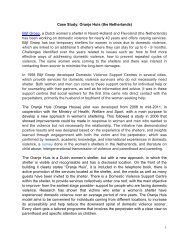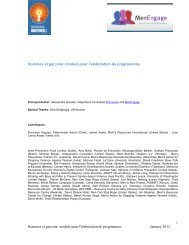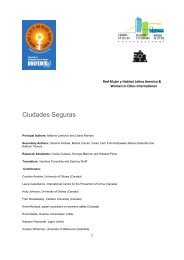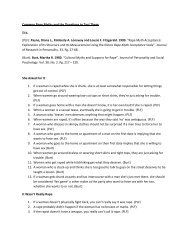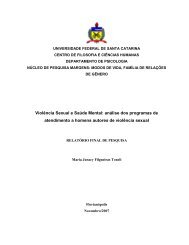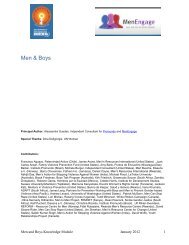Campaigns to End Violence against Women and Girls - Virtual ...
Campaigns to End Violence against Women and Girls - Virtual ...
Campaigns to End Violence against Women and Girls - Virtual ...
You also want an ePaper? Increase the reach of your titles
YUMPU automatically turns print PDFs into web optimized ePapers that Google loves.
countries, breakfast briefings earlier in the morning could also be useful <strong>to</strong> offer <strong>to</strong> attract<br />
media attendance.<br />
3. Pick the site.<br />
Choose a location for the press conference that is easy <strong>to</strong> reach <strong>and</strong> not <strong>to</strong>o far for<br />
reporters <strong>to</strong> travel. Ideally, the site should offer visual interest <strong>and</strong> relationship <strong>to</strong> the<br />
<strong>to</strong>pic – e.g. a government building, a courthouse, or a local clinic. Choose a place with<br />
little background noise (e.g. from traffic, telephones, aircraft), <strong>and</strong> which has adequate<br />
electrical outlets <strong>and</strong> extension cords for lighting <strong>and</strong> other purposes.<br />
4. Select <strong>and</strong> train participants.<br />
Speakers must be knowledgeable <strong>and</strong> articulate. They should be able <strong>to</strong> h<strong>and</strong>le press<br />
questioning <strong>and</strong> scrutiny as well. People with high credibility, such as local politicians,<br />
the direc<strong>to</strong>r of a well-known organization, a physician or a judge may make effective<br />
spokespeople. Firsth<strong>and</strong> testimony from people affected by the issue can be extremely<br />
powerful <strong>and</strong> convincing. If survivors of VAW are <strong>to</strong> give any testimonies at a press<br />
conference, ensure they are psychologically ready for it, <strong>and</strong> that ethical rules are strictly<br />
followed. Plan for any difficulties that may arise for them during the event.<br />
Tips for participants:<br />
- Be clear <strong>and</strong> concise – avoid using jargon, rhe<strong>to</strong>ric, digressions or inflamma<strong>to</strong>ry<br />
language.<br />
- Assume the audience is intelligent – avoid sounding patronizing.<br />
- Do not fiddle with or clutch anything – it’s distracting <strong>and</strong> makes you appear nervous.<br />
- Appearance counts – participants should be dressed neatly <strong>and</strong> appropriately for<br />
the occasion.<br />
- Always tell the truth. If you do not know the answer <strong>to</strong> a question, say so. Do not<br />
exaggerate or give figures that aren’t backed up by evidence, <strong>and</strong> do not state<br />
opinions as facts.<br />
Find a modera<strong>to</strong>r who is experienced with the press <strong>and</strong> the issue. She or he will<br />
facilitate the press conference by introducing the issue <strong>and</strong> participants. The modera<strong>to</strong>r<br />
also directs questions <strong>to</strong> the appropriate participants. If you are inexperienced with press<br />
conferences, attend the press conference of a different group <strong>to</strong> familiarize yourselves.<br />
Conduct a dress rehearsal, i.e. a private simulation of the real press conference.<br />
Speakers should have scripts <strong>to</strong> memorize the 3-5 key points, <strong>and</strong> <strong>to</strong> ensure they speak<br />
no longer than 3-5 minutes each. During the rehearsal, get someone from your group <strong>to</strong><br />
ask challenging questions in preparation for difficult situations at the real press<br />
conference.<br />
A suitable response <strong>to</strong> a <strong>to</strong>ugh or misguided question might be, "That's a good<br />
question, but it is not within the scope of this press conference. Our focus <strong>to</strong>day is on...”<br />
If the question is legitimate but you do not know the answer <strong>to</strong> it, call on someone else<br />
from your group, or check out the answer <strong>and</strong> get back <strong>to</strong> that reporter later.<br />
5. Contact the media.<br />
Create a comprehensive mailing list of reporters <strong>and</strong> edi<strong>to</strong>rs at television stations, news<br />
direc<strong>to</strong>rs at radio stations, <strong>and</strong> at major newspapers, edi<strong>to</strong>rs at weekly newspapers <strong>and</strong><br />
news wire services. Make sure you include reporters who may have covered the issue in<br />
recent months. Mail your press advisory about one week ahead of time <strong>to</strong> the media,<br />
<strong>and</strong> then again on the day before the meeting.<br />
186<br />
<strong>Campaigns</strong> December 2011



